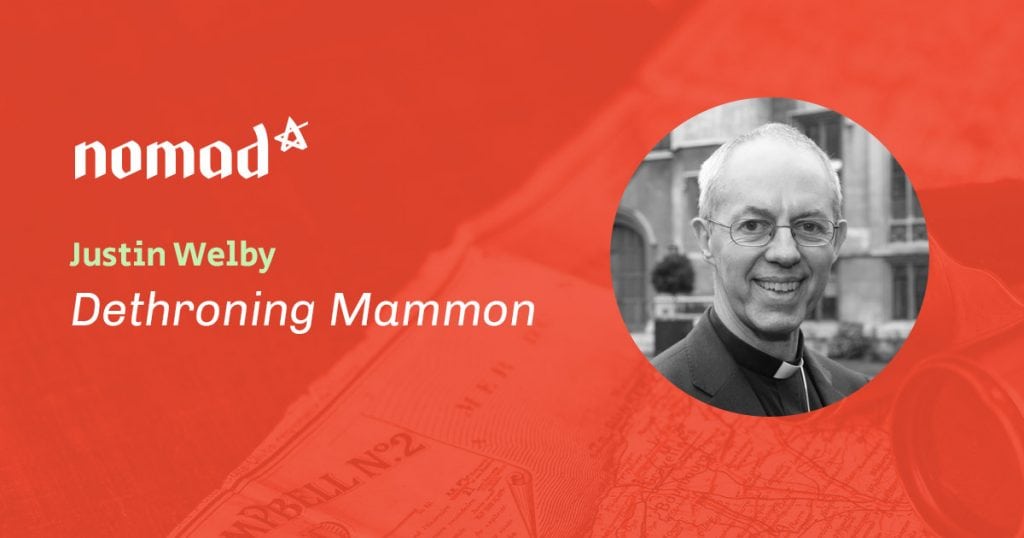We’ve been wanting to do an episode on money for a while now, so when the Archbishop of Canterbury Justin Welby put pen to paper and wrote his first book – Dethroning Mammon– all about the dangers of money, we seized upon the opportunity and headed off for Lambeth Palace. We asked the Archbishop what his life experience has taught him about money and how it shapes what we value and where we place our identity. Tune into the podcast for a honest, humble and insightful conversation.
Interview starts at 6m 27s

Image provided by The Office of the Archbishop of Canterbury. Used with permission.
BOOKS
Dethroning Mammon: Making Money Serve Grace
Reimagining Britain: Foundations for Hope
QUOTES
“It’s not wrong to measure things, it is wrong to let the measuring dominate the way we think.”
“I found that there was no sense that I was anyone different to who I thought I was, I was who I was in Jesus Christ and nothing else.”

5 Responses
If you read the book of Sirach aka Ecclesiasticus, it gives some advice on money and how to spend it, as well as some of the downfalls of not having anything. There are some meterics that it seems are better left ignored according scripture such as taking a census. King David found this out the hard way. In The Sermon, everything we are to do is to be done in faith, and therefore privately between ourselves and our Father in Heaven, who truly sees everything we do, the good and evil. This is more to do regarding motives. Is our motive to impress others we see or our Father, whom we don’t see. Doing things privately purifies our faith, our motives.
It reminds me of a definition of integrity that I heard, it’s how you behave when no one is looking.
Yes, and if you can behave (obey traffic laws, tax laws, etc. ) while no one is looking, you prove wrong those who say obeisance to Christ is impossible. The so called faith alone i.e. faith apart from good deeds camp, rationalize that good deeds equal the works Saint Paul speaks of. The works Saint Paul is against are those works *not* done in faith. The works taught by Rabbi in The Sermon are all _works of faith_, and are possibly to do, and have merit in Heaven. They are works of faith, because to do them requires faith. Sirach’s observance of how the rich do things is similar to Tevye’s song in “Fiddler on the roof” _If I where a rich man_. It seems that having/obtaining riches (Mammon), even in Sirach’s (Jesus Ben Sira) time, was equated to all virtues. Sirach points out however, that being poor, is not a sin. Look up Matthew 6.23, one of many real life examples of this darkness is in The USA with our Republican Party, who use religion as a cloak to gain votes.
Thank you! I enjoyed this podcast a lot, Justin Welby sounds like a genuine guy! You guys are always so funny and still manage to get to the point (somehow, eventually).
Something you said in this podcast and also in one of the earlier ones (I cant remember which one) made me think about John Barclay’s book Paul and the Gift. I highly recommend it (alongside Seneca’s On Benefits). Barclay shows that the ancient gift-giving was based on relationships and that it was not anonymous. Seneca thinks that gift is really a loan, in one form or another. The first installation ought to be gratitude (the lack of it is one of the main problems in Seneca’s view). Barclay exposes the idea of the altruistic gift as a rather modern innovation, and forces to think about grace differently (and helps biblical scholars come into terms and understand what each is saying when they speak of grace). Barclay’s books first chapters where he lays out the taxonomy of ancient gift is the most valuable part of the book and should be easy to read.
Hi Tommi,
Thanks for your post. Glad you enjoyed the episode with the Archbishop! I did notice Barclay’s book when it came out, but then I noticed it was 672 pages long and £45! I’ve heard good things about it though.I’ll drop him a line and see if he’s up for writing a blog post summarising his ideas, that’d perhaps make it more accessible for our followers.
Tim